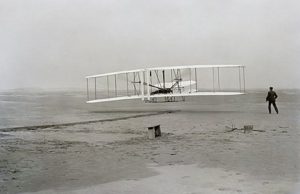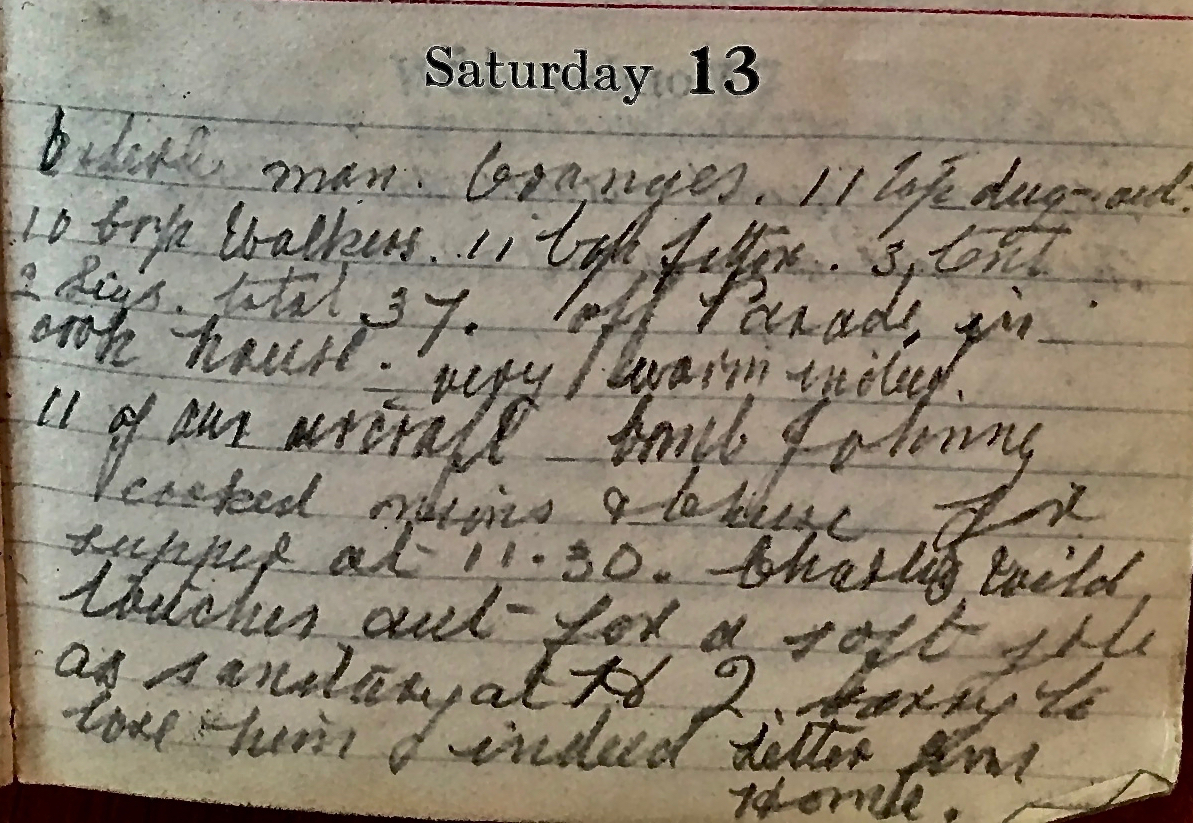Saturday April 13th, 1918
Orderly man. Oranges. 11 top ??dug-out, 10 group?? walkers??, 11 for fitter??, 3 tent, 2 Sigs. Total 37. Off parade in cook house. Very warm indeed. 11 of our aircraft bomb Johnny. Cooked onions and cheese for supper at 11:30. Charlie Wild† touches out for a soft role as sanitary at HQ. Sorry to lose him indeed. Letter from home.
Oranges
Frank is on cookhouse duty again. Apart from peeling potatoes and washing dixies, it seems that Frank has been given the happy task of distributing a bounty of oranges. This must have been a big deal as he is very specific about how many he hands out and to whom. Unfortunately, I haven’t been able to decipher Frank’s writing. Any ideas gratefully received. However, I think three went into Frank’s tent – for which his bunk mates must have been grateful.
Aeroplanes
Both Frank and the Battalion mention aeroplanes today. It sounds as though Frank counted them, as he seems very sure of the number. The Battalion calls them ‘bombing machines’ today and both diaries have used a variety of terms to describe planes. Understandably, after all these were not just the early days of wartime aviation but the early days of powered flight.
It was also quite the spectacle. In March 1916, Archibald Don wrote, ‘After the war our equivalent of gladiatorial displays will be aerial contests between artillery and aircraft. … For on a fine day, against a blue sky and clouds, or, as we had it yesterday, at dawn, it is a glorious and exhilarating sight.’º
The Royal Air Force (RAF)
The rapidly expanding and important role that aircraft could play in warfare was understood almost immediately the war started. A few days ago, on April 1st, 1918, the Royal Flying Corps and the Royal Naval Air Service combined to create the ‘Royal Air Force’. The RAF became the third leg of the armed services, joining the Army and the Royal Navy. As such, it was recognized as an important element of Britain’s defence capability, which now covered land, sea and air.

This had not always been the case. In late February 1918, the Observer recalled, ‘Time has its revenges…. Nine years ago, almost to the day, the Secretary of War was asked in the House… whether he would put an end to the further waste of public money on experiments with airplanes and airships by ordering their immediate abandonment! The Minister replied that up to that date a total of about GBP 19,000 had been expended.
It is a matter of history that about that date the War Minister declined to enter into negotiations with the Wright brothers. It may be interesting to recall that the total expenditure on aircraft in 1909 was GBP5,270. In 1910-11 the Estimates were for GBP 133,300. In the following year a total of about GBP 410,000 was expended. In 1913-14 the total slightly exceeded GBP 1,000,000. But until this year the cost of the Air Services were no more than relatively small items included in the Navy and Army Estimates.’¹
13th (Service) Battalion War Diary – 13th April 1918 – Saida
The GOC 66th Inf Bde visited the work on Le Commandant which was proceeding according to programme (see App No 3). About 10 of our bombing machines passed over at about 08:00hrs on their way back from dropping bombs in the direction of Pobreg.
References & Further Reading
† Private Charles Wild, 304082, 13th then 9th Battalion, Manchester Regiment
° ‘Archibald Don – A Memoir (1890-1916)’, from the collection of the Salonika Campaign Society
¹ ‘Nine Years Ago’ from The Observer, February 24th 1918, page 5
The Wright Brothers in Wikipedia



Hello again Caroline,
Frank delivered the oranges as follows.: 11 top dugout, 10 C(o)rp(oral) Walker‘s and 11 Crp Fitton.
Were Cpl Walker and Cpl Fitton possibly in charge of dugouts ? It looks as though Frank did not know who was in charge of the top dugout.
Charlie
Thanks Charlie! It all makes much more sense now.